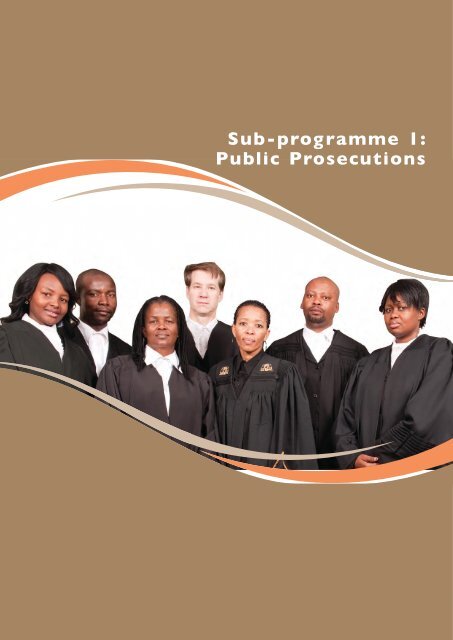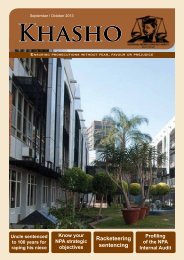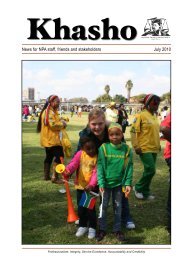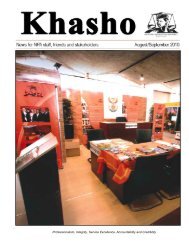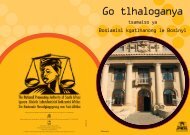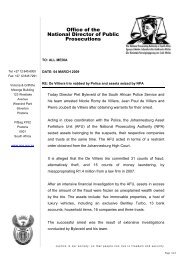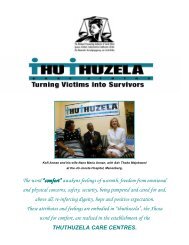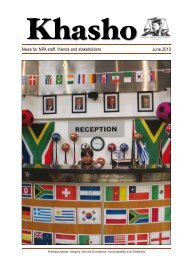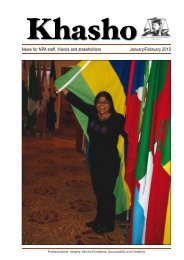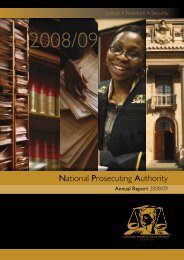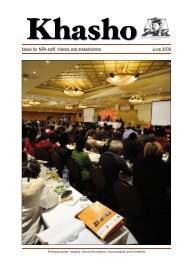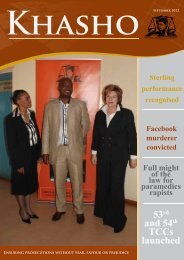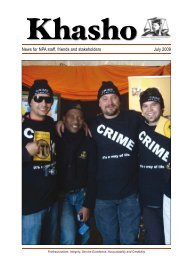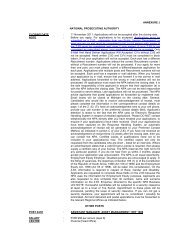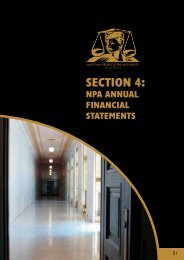07 NPA Sub Programme 1 - Institute for Security Studies
07 NPA Sub Programme 1 - Institute for Security Studies
07 NPA Sub Programme 1 - Institute for Security Studies
Create successful ePaper yourself
Turn your PDF publications into a flip-book with our unique Google optimized e-Paper software.
20 Annual Report 2010/11<strong>Sub</strong>-programme 1:Public Prosecutions
6. <strong>Sub</strong>-programme 1: Public ProsecutionsPurposePublic Prosecutions provides <strong>for</strong> general prosecutions and several specialist prosecution units, such as those <strong>for</strong>priority crimes litigation, sexual offences and community affairs, and specialist commercial crime.IntroductionThe <strong>NPA</strong> provides prosecution services in the Lower and High Courts in all the nine provinces and collaborateswith national and international stakeholders where necessary. The PCLU focuses on serious national and internationalcrimes, including treason, sedition, terrorism, sabotage and military crimes committed by mercenaries in <strong>for</strong>eigncountries. The SOCA develops strategy and policy, and oversees the management of cases relating to sexualoffences, domestic violence, human trafficking, maintenance offences and young offenders. The sub-programmealso provides specialist prosecution support to the DPCI. The SCCU focuses on serious economic crimes.Strategies, Projects and InitiativesDeliver a speedy, quality prosecution within the prescripts of the lawA breakdown per <strong>for</strong>um of the 460 891 cases that were finalised by all courts during 2010/11 is indicated inthe table below:Table 8: Annual Comparison of Cases Finalised: 2009/10 - 2010/11FORUM 2009/10 % of National 2010/11 % of National DeviationHigh Court 1 235 0.3% 1 087 0.2% -12.2%Regional Court 40 962 8.7% 39 197 8.5% -4.3%District Court 427 344 91.0% 420 6<strong>07</strong> 91.3% -1.6%ALL 469541 100.0% 460 891 100.0% -1.8%A total of 604 plea and sentence agreements have been successfully concluded comprising of 2 034 counts. Eventhough the number of agreements concluded does not appear to be significant, the counts involved in thesematters would have taken some time to finalise if trials were to be conducted. In 184 (36%) of the cases, thesentences imposed comprised of direct imprisonment.District Court Per<strong>for</strong>manceThe District Courts finalised 420 6<strong>07</strong> cases consisting of 292 648 verdict cases (69.6%) and 127 959 ADRMcases (30.4%). This represents a finalisation rate of 2.3 cases per court per day. Compared to the previousfinancial year, the District Courts finalised 6 737 fewer cases (-1.6%). High conviction rates were maintainedand during 2010/11 a conviction rate of 90.7% was achieved by all District Courts. Noteworthy is the total of1 471 compensation orders that were granted to victims of crime.Figure 3: District Courts: Cases Finalised 2010/11In<strong>for</strong>mal Mediation 81 834Diversion Adults 29 980Diversion Children 16 145Verdict 292 648Annual Report 2010/1121
Regional Court Per<strong>for</strong>mance:The Regional Courts finalised 39 197 cases comprising 37 310 verdict cases (69.8%) and 1 887 ADRM cases(4.8%). This represents a finalisation rate of 0.5 cases per court per day. Compared to the previous financialyear, the Regional Courts have finalised 1 765 fewer cases (-4.3%). A conviction rate of 73.4% was achievedby all Regional Courts. A total of 196 compensation orders were granted to victims of crime.Figure 4: Regional Courts: Cases Finalised 2010/11In<strong>for</strong>mal Mediation 1 474Diversion Adults 96Diversion Children 317Verdict 37 310High Court Per<strong>for</strong>mance:The High Courts finalised 1 087 cases. A total of 1 050 cases were finalised by means of trial in the High Courtwhilst 37 related to cases convicted by Regional Courts and transferred to the High Court <strong>for</strong> sentencing andwere finalised by the High Courts. A conviction rate of 87.8% was achieved by all High Courts.Figure 5: Case Management: High CourtsNew Cases 1 <strong>07</strong>5Removed from Roll 134Total Finalised 1 087Referred Back 2Guilty 954Acquitted 13322 Annual Report 2010/11
Court PreparationThe Court Preparation <strong>Programme</strong> continues to offer support services to witnesses, especially women and children.There are 125 Court Preparation Officers (CPOs) employed at 68 courts countrywide against a target of 140.During the period under review 69 196 witness sessions were conducted by CPOs which is an average of 56witnesses per CPO, and the target of 60 was there<strong>for</strong>e not achieved.Use of suitable alternatives to punitive justiceDuring the reporting period a total of 129 846 cases were finalised by means of ADRM of which a total of1 887 (1.5% of national total) were finalised by the Regional Courts and 127 959 cases (98.5% of nationaltotal) by the District Courts.Alternative dispute resolution encompasses diversion and in<strong>for</strong>mal mediation as methods of resolution ofdisputes between the parties. During the current reporting period, a total of 38 669 cases were diverted afterenrolment, a total of 7 869 cases were diverted be<strong>for</strong>e enrolment in terms of the CJA and 83 308 cases weresuccessfully mediated on an in<strong>for</strong>mal basis. The focused approach on alternative measures to reduce trial caseshas resulted in a 22% increase in the number of cases in<strong>for</strong>mally mediated compared to the total of 68 270cases mediated during the previous financial year.Diversions in terms of the Child Justice ActThe CJA came into operation on 1st of April 2010 and created a new procedural framework <strong>for</strong> dealing withchildren who were in conflict with the law. This Act seeks to ensure children’s accountability and respect <strong>for</strong> thefundamental freedoms of others, and to prevent crime and promote public safety through the use of diversions,alternative sentencing and restorative justice.Since April 2010, a total of 15 588 children were dealt with of which 910 children (5.8%) were between theages of 10 – 13 years and 14 678 children (94.2%) were between the ages 14 – 17 years old.The table below indicates the manner in which the children were dealt with. Noteworthy is the fact that 795children below the age of 10 years were referred in terms of Section 9 of the Act, 2 444 children were divertedin terms of Section 41 of the Act and 4 630 children were diverted during the preliminary inquiry phase.Table 10: Breakdown of the manner in which children in conflict with the law weredealt withFORUM SEC.9 REFERRALS SEC 41 DIVERSION PRELIMINARY INQUIRY DIVERSIONDistrict Court 788 2 401 4 561Regional Court 7 43 69TOTAL 795 2 444 4 630During 2010/11 a total of 444 children were convicted with a conviction rate of 79.3% after the case has beenreferred <strong>for</strong> trial whilst 1 162 children were still diverted during the trial stage. Noteworthy is that 1 581children successfully complied with the diversion programme and in only 112 matters a more onerous diversionprogramme had to be chosen.Develop Dedicated Capabilities <strong>for</strong> Crime Focus AreasComplex Commercial CrimeDuring the current reporting period, a total of 10 dedicated commercial crime courts finalised 742 cases with aconviction rate of 92.5%. A reduction of 1.5% is noted in the conviction rate compared to the previous financialyear. The reduction in cases finalised is ascribed to an increased focus on more serious matters that are timeconsuming to prosecute. In addition, the opening figure <strong>for</strong> 2009/10 was overstated in the ENE, on which targets<strong>for</strong> 2010/11 were determined. In the AENE process, National Treasury (NT) was requested to adjust the actual2009/10 per<strong>for</strong>mance, but this was not published.24 Annual Report 2010/11
Specialised ProsecutionsThe <strong>NPA</strong> finalised 399 specialised tax prosecutions with a conviction rate of 96.7%. From April 2010, the TaxComponent resorted under the specialised prosecution work stream in the DPP offices and will continue towork on tax matters.Organised CrimeAt the end of the 2010/11 financial year there were 95 cases on the court roll of which 72 were on trial. Theother 23 had not commenced due to a number of reasons. These 95 cases include Racketeering, Gang Relatedand Money Laundering cases. Nationally, 18 Racketeering cases were authorised by the NDPP. 15 cases weresuccessfully finalized and sentenced these comprise of seven racketeering, two gang and six money launderingcases.2010 FIFA World CupPart of the requirements <strong>for</strong> successfully hosting the 2010 FIFA World Cup was the development of a 2010FIFA World Cup Administration of Justice Operational Plan. The plan was developed by all stakeholders ofthe Integrated Justice System, which included the <strong>NPA</strong>, Legal Aid South Africa and the Judiciary.The 2010 FIFA World Cup placed extra burden on the officials within the <strong>NPA</strong> and 260 prosecutors weredeployed at the 56 dedicated court rooms in the 9 host cities. These included 37 District Courts and 19 RegionalCourts. These courts operated from 7h45 until 23h00, seven days a week. 222 cases went through the SpecialCourts during the 2010 FIFA World Cup, of which 202 were finalised, with 138 convictions.ProsecutionsTrio CrimesReduction in the levels of trio crimes is one of the JCPS objectives <strong>for</strong> 2010/11 and the <strong>NPA</strong> indicated in itsStrategic Plan that it will contribute to the achievement of this output through focusing on the prosecution ofthese matters. During the current reporting period, the courts disposed of 795 cases comprising 1 099 triocounts of which a total of 535 cases were finalised and 260 cases were removed from the roll. A total of 453cases were convicted with a conviction rate of 85.6%. The manner of disposal is illustrated below.Table 11: Disposal of Trio CrimesMANNER OF DISPOSAL CASES COUNTSGuilty 453 698Cases FinalisedNot Guilty 76 106Mediation 5 5Diversion 1 1Cases finalised total 535 810Cases RemovedWithdrawn 210 234Warrant 9 12Struck off the Roll 25 26Transferred 16 17Cases removed total 260 289TOTAL DISPOSED 795 1 099Sexual Offences and Community Affairs (SOCA)The SOCA Unit develops strategy and policy relating to sexual offences, domestic violence, human trafficking,maintenance matters and young offenders. The broad outcomes that SOCA seeks to achieve are to:• Improve the conviction rate in gender-based crimes and crimes against children;• Actively protect vulnerable groups from abuse and violence;• Ensure access to maintenance support; and• Systematically reduce secondary victimisation.Annual Report 2010/1125
Highlights of achievementsMaintenance MattersA total of 75 specialist maintenance prosecutors dealt with 143 505 (120 <strong>07</strong>9 in 2009/10) <strong>for</strong>mal and in<strong>for</strong>malmaintenance enquiries and finalised 86 149 (60%) compared to 75 717 (63% in 2009/10) matters, a decreaseof 3% from 2009/10. A total of 180 prosecutors were trained on the comprehensive manual on maintenancematters in line with the Maintenance Act and latest developments in law.Child Justice Act (CJA)• 349 prosecutors were trained on the CJA.• Comprehensive inputs on training and diversions statistics, amongst others, were submitted to Parliament onthe implementation of the CJA.Develop capability to successfully deal with cases affecting mainly women andchildrenSexual offences• Provided Phase 3 training on the sexual offences legislation to 178 prosecutors.• The 3rd Sexual Offences Indaba was held in Johannesburg from 16 to 17 August 2010, and was attended by270 delegates from all provinces. This is a vital process in ensuring stakeholder cooperation and coordinationof all related activities <strong>for</strong> gender based violence in line with SOCA’s mandate.• The Unit hosted the 2nd International Advisory Reference Group in Pretoria, from 11 to 14 August 2010.This is an advisory group of international experts on gender based violence.• SOCA participated in the Southern African Development Community (SADC) Gender Justice project, astudy tour initiated by DoJ&CD, which focuses on gender justice activities in three identified SADC membercountries, Botswana, Malawi and Namibia.• The Unit Head presented the TCC-model in Benin.• Building on the success of the Benin visit, the Unit Head led a coordination session in Kenya during January2011 which brought together Kenya, South Africa and Zambia. Focus was to critically analyse the effectivenessof the various Women’s Justice Empowerment Initiative programmes as implemented in the countries, toshare expertise, discuss sustainability and plan future deliverables.• Two SOCA representatives attended the United Nations Commission on the Status of Women Conferencein New York. The SOCA team participated in deliberations and presented a paper on the management ofgender based violence in SA and the TCC-model.• The Unit embarked on a technical assistance training programme with Mozambique which was delivered inMaputo (14-18 March 2011) and was attended by approximately 45 seasoned delegates from the prosecution,police and health services. The content of the training material focused on topics of social context, adultand child witnesses in gender based violence, domestic violence, TCC-model, human trafficking, reciprocalmaintenance orders, extradition, commercial crimes and corruption. SOCA was responsible <strong>for</strong> developingand compiling the content of all relevant topics excluding commercial crimes, corruption and extradition(which was compiled by colleagues from SCCU and DPP North Gauteng).Domestic violence• An integrated Domestic Violence (DV) Skills manual training was provided to 102 prosecutors.• Provided training on Safety Planning <strong>for</strong> victims of Domestic Violence to 27 delegates comprising of prosecutors,clerks of the courts, court preparation officers and traditional leaders.• Developed the National 365 days <strong>Programme</strong> and National Action Plan <strong>for</strong> an end to gender violence.26 Annual Report 2010/11
Trafficking in persons• 79 prosecutors were trained on human trafficking related topics.• In addition to the a<strong>for</strong>esaid, 30 prosecutors were invited from the said sessions to attend the train-thetrainersworkshop in Pretoria.• An integrated training on combating human trafficking was provided to 30 police officials, prosecutors andimmigration officers. In addition, 52 delegates from immigration, police, customs and representatives fromSouth African Revenue Service (SARS) were also trained.• Trafficking in Persons Task Team was established <strong>for</strong> Gauteng with strategic planning session. Currently thereare task teams in Gauteng, Kwa Zulu Natal, Western Cape, Mpumalanga and Limpopo. The team <strong>for</strong> Limpopoalso presented to provincial coordinators and NGO representatives on human trafficking hosted by the officeof the Premier in November 2010.• An <strong>NPA</strong> delegation consisting of members of SOCA presented the inputs and interpretation regarding thelatest draft of the “Prevention and Combating of Trafficking in Persons Bill”, to the Portfolio Committee onJustice and Constitutional Development.Increase the number of TCCsFive additional TCCs were established bringing the total to 27. In addition to this, SOCA has identified 18 siteswhich will be operational once the appointment of the relevant personnel is finalised. TCC cases received atcourt increased from 6 410 in 2009/10 financial year to 9 716 in 2010/11.Annual Report 2010/1127
Priority Crimes Litigation Unit (PCLU)Highlights of AchievementProviding assistance to Canada: A delegation of four persons from the Canadian War Crime Unit visitedSouth Africa from 17 January 2011 till the end of January after a <strong>for</strong>mal Mutual Legal Assistance (MLA) requestwas approved. The PCLU hosted them and ensured that the interviews with the witnesses were concluded tosatisfaction of the Canadian Authorities.S v Mechem: A Section 105A Plea Agreement was concluded with Mechem in relation to the export of twomine-protected vehicles which were exported to Croatia, but had not been returned to South Africa withinthe period prescribed in the permit. The accused pleaded guilty to a technical contravention of the NationalConventional Arms Control Act and was sentenced to pay a fine of R25 000 on 29 March 2011 be<strong>for</strong>e aRegional Magistrate, Pretoria.Attempted murder of Rwandan General Nyamwasa: The Unit provided assistance in this matterwhere ten <strong>for</strong>eign persons were arrested <strong>for</strong> inter alia the attempted murder of and the conspiracy to murder<strong>for</strong>mer Rwandan General Nyamwasa, who has asylum in South Africa. The matter has been adjourned <strong>for</strong> trialin June 2011.TRC matters: The PCLU furnished specific additional guidance to investigating officers from the Directorate<strong>for</strong> Priority Crime Investigations (DPCI) in respect of Pebco 3, Cradock 4, Nokuthula Simelane and HighgateHotel matters.S v André Visagie: The PCLU provided assistance on the Visagie matter, the <strong>for</strong>mer secretary-general ofthe AWB, who was the leader of a newly established right-wing extremist organisation, namely, GeloftevolkRepublikeine. A search and seizure was conducted at his residence by SAPS after in<strong>for</strong>mation was receivedthat he was in the process of committing acts of terrorism and was in possession of unlicensed firearms andammunition.Financial Action Task Force (FATF) Proliferation Project: A member of the PCLU was requestedto <strong>for</strong>mulate the South African position on specific issues raised by FATF, which were required to be debatedby FATF’s Working Group on Terrorism and Money Laundering on 15 April 2011.Providing training to Ugandan Judges and National Intelligence Coordinating Committee(NICOC): The Unit was requested to provide NICOC with legal advice on the country’s counter-terrorismlegislation and relevant international conventions and <strong>Security</strong> Council resolutions.Research and briefingsA member of the Unit provided the Chairperson of the Proliferation Council with a full briefing on a numberof proliferation issues to enable him to engage with the International Atomic Energy Agency and the GermanGovernment. Similarly the Unit provided a briefing to the APS Legal Division on deficiencies in Protection ofConstitutional Democracy against Terrorist and Related Act (POCDATARA) and was requested to furnish awritten opinion so as to lay the basis <strong>for</strong> amendments to the Act next year.Missing Persons Task Team (MPTT)Jozini Dam Death Sites, KwaZulu Natal: Responsibility <strong>for</strong> managing the symbolic repatriation of remainsblown up that cannot be located was handed over to the Truth and Reconciliation Commission (TRC) Unit.• Investigations are underway together with City Parks Department in Johannesburg to trace a number ofpauper graves believed to belong to missing activists including Leon Tume, Sandile Nqobe and others.• Kunyumane Ranyao/Selby Mavuso cases: Reports were prepared and meetings were held with familiesinvolved in the mix-up of remains in these two cases and the incorrect identifications done during TRCexhumations.• MK Valdez: A pauper grave believed to contain the remains of MK commander Valdez (real name Xolile Sam)from Port Elizabeth, who was killed by Vlakplaas Commander Eugene de Kock in Vosloorus in November1988 was identified in Vosloorus cemetery. His family was briefed.28 Annual Report 2010/11
Noteworthy CasesDA v NDPP (Presidency and Minister of Justice cited as respondents): The DemocraticAlliance challenged the appointment of the NDPP by the Presidency and based its argument on the fact thatthey believed him to be unfit to hold the office of the NDPP. They maintained that they had the necessary locusstandi (legal standing in law) to bring such an application <strong>for</strong> the NDPP’s appointment to be declared invalidand as such to be set aside by the High Court. The application was dismissed with costs.Democratic Alliance v The NDPP (JZ Prosecution): This is another case that had constitutionalimplications as the DA had approached the High Court in a bid to compel the then Acting NDPP Adv MokotediMpshe to provide them with records of the representations submitted by the legal representatives of PresidentZuma in their ef<strong>for</strong>ts to have the corruption charges against him withdrawn. The then Acting NDPP had withdrawnthe charges against the President on the basis that the prosecution process had been tainted and there<strong>for</strong>e hisprosecution would not be fair administration of justice. The <strong>NPA</strong> in defence of the then ANDPP argued that hewas merely exercising the discretionary powers vested in him by both the <strong>NPA</strong> Act and the Constitution. Wewent further to argue that there is currently no legislation in South African law that provides <strong>for</strong> compulsoryprosecution. The High Court concurred with this argument and ruled in favour of the NDPP. However, the matteris in the process of being enrolled as an appeal and will be closely monitored.State v Jub Jub and Another (Culpable homicide converted to murder): The legalrepresentatives of the accused in this case were shocked to learn that the state decided to charge them withfour counts of murder instead of culpable homicide. Many South Africans are accustomed to the usual charges ofculpable homicide which is the unintentional causing of death of a human being under negligent circumstances.A conviction on this charge usually attracts a non-custodial sentence which has an element of downplayingthe seriousness of the offence and the impact it has on the family of the deceased or victims. The NDPP feltthat deaths resulting from motor vehicle collisions were at an alarming rate with those convicted receivingsentences considered lenient if one has regards to the loss of human lives. A directive was then issued by theNDPP to all prosecutors to consider charging all drivers with murder in instances where evidence shows thatthere was an element of intention on the part of the driver. This caused a lot of media frenzy with some legalexperts arguing that it will be difficult <strong>for</strong> the State to prove the element of intention but this has not deterredprosecutors from following the directive which some consider to be long overdue. This case will definitely havelegal implications as the elements of the offence of murder will be put to test.Jules High School Case Sexual Offences and Related Matters Act): This is one case thathad the <strong>NPA</strong> and the NDPP in particular criticised by both the media and the public in general after the NDPPauthorised prosecution of all the pupils involved in that prohibited sexual encounter. The criticism stems frommassive media coverage of the incident which led to many people believing that the child victim had beendrugged and then raped by the two boys. The media reports had been made be<strong>for</strong>e the case was <strong>for</strong>mallypresented to the prosecutors. It was only after evidence had been evaluated that a decision was taken by theNDPP to charge all three pupils in contravention of the Sexual Offences and Related Matters Act <strong>for</strong> engagingin consensual sexual penetration while under the age of 16 years. Legal experts criticised the legislation whileNGOs and the public criticised both the legislation and the decision to charge them.A decision was taken by the prosecution to divert them from the criminal justice system as the <strong>NPA</strong> felt thatthey had behavioural problems that could be addressed through professional guidance. This decision was endorsedby the court and commended by many.State v Mngadi & Others (Racketeering): The organised component in the NDPP’s office ensuredthat the POCA provisions relating to money laundering were effectively used in cases where fraud and theftprove to be quite problematic to sustain a conviction. The accused in this case received a total of 15 yearsin prison. In the past they would have been acquitted but charging them with money laundering has been aneffective tool to overcome legislative challenges which were encountered in the past.Racketeering has also proved to be an effective tool that can be utilised in prosecuting all kinds of organisedcrime as seen in the Mngadi case that led to conviction and total of 63 years in prison. Had the accused beencharged with theft only, they would have received lenient sentences.Annual Report 2010/1129


